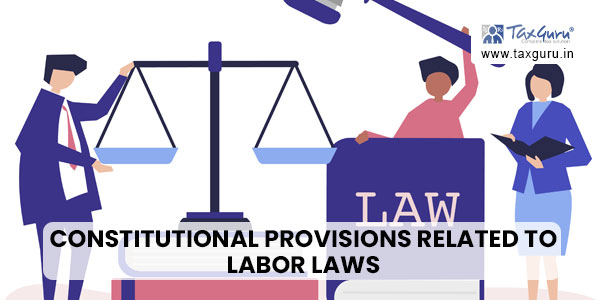The constitution of India is supreme in nature which provides the base and wedlock for enacting the laws also guides for interpreting the laws. The labor legislation is divided into three categories Protection laws, social security laws and welfare laws. The question arises why labor provisions are added in the constitution, the answer is the rights i.e. Right to equality, justice social rights and we are obligatory to the united nation organization, the people aspiration by freedom fighter are reasons for the above question.
Fundamental Rights and labor legislation
Fundamental rights are guarantee and assurance to the people against the state and seven fundamental rights are guarantee at the time of drafting the constitution but now there are only six fundamental rights that guarantee or related to labor legislation. The very first fundamental are Article 12 which defines the state which means if there any breach to labor this will cover under article 12 like dispute related to expenses, deep and persuasive control of states, functionality for public wellbeing and government, government department transferred to that instrument ability. Article 14 guarantees Equality before law which guarantee equal pay for labors according to their physical ability, unskilled and skilled labor. Article 15 guarantees that the state (defined in article 12) shall not discriminate any citizen of India on ground of sex, place, caste, religion or any of them. This article guarantees labor that they will not discriminate on the above grounds and work freely and get wages according to their skills. Article 19 guarantee labor and give powers to various workers and trade unions to form association or group to raise their voice against any discrimination happened. The trade union discusses the problem, and solve them by way of strikes and any other way. Article 23 abolishes and prohibit forced labor which means one can force any worker or labor to work or against their will without any reasonable grounds. This is abolished or added in the constitution because British before independence ruled over India and forced labor to work for their country or company. Article 24 prohibits employment of child which is below 14 years i.e. prohibit child labor. This article is based on the principle of protecting children from exploitation and ensuring their right to education and a healthy childhood. It is an important provision for safeguarding the rights and welfare of children in India.

Constitutional remedies and Directive Principle of state policy
Article 32 talks about writs various writs, these writs are so much important for individual rights and cannot be deemed that why it is called soul of the constitution. These rights cannot be delayed hence an individual can approach Supreme Court and High court directly for violation of their fundamental rights. Article 38, 39, 41, 42 and 43A are the articles associate with labor legislation. Article 38 promote the welfare of the people at all the institution of national. It gives the direction to the state to secure the social order and promotes the welfare. It minimize the economic inequality and eliminate the social inequality and efforts to ensure availability of facilities and opportunities amongst all. Article 39 is substitute of Minimum wage act which ensure adequate means of livelihood. Equal pay for equal work amongst men and women. Distribution of resources should be common for all. Evolve such operative economic system which resulted in on concentration of wealth and means of production. Worker situation must be that it ensure freedom and dignity of child, protection against exploitation must be protected. Health of the workers should not be abused and forcibly evolved in the employment unsuited to them. The tender age of the child must be considered further child must be provided with facilities and opportunities to develop in a healthy manner. Policies frame for the protection of moral and material abundant.
Conclusion
The Indian Constitution serves as the foundation for all laws in our country. Labor laws are also made in line with the constitution, and any breach of constitutional laws results in the repeal of that law. The Directive Principles of State Policy play a significant role in the development of new labor legislation in India. In many ways, the Indian Constitution recognises and protects laborers’ fundamental rights. The incorporation of labor laws into the Constitution underscores the significance of labor rights and their protection for the nation’s social, economic, and moral development. The Constitution establishes legal remedies and a framework to defend fundamental rights, ensuring that workers are not exploited and are treated with dignity and respect. The directive principles of state policy also provide a framework for improving laborer welfare, ensuring enough means of livelihood, and protecting their health and dignity. Overall, the Indian Constitution provides a comprehensive framework for assuring the preservation, promotion, and equitable treatment of labor rights, which is critical for the growth of the country.




